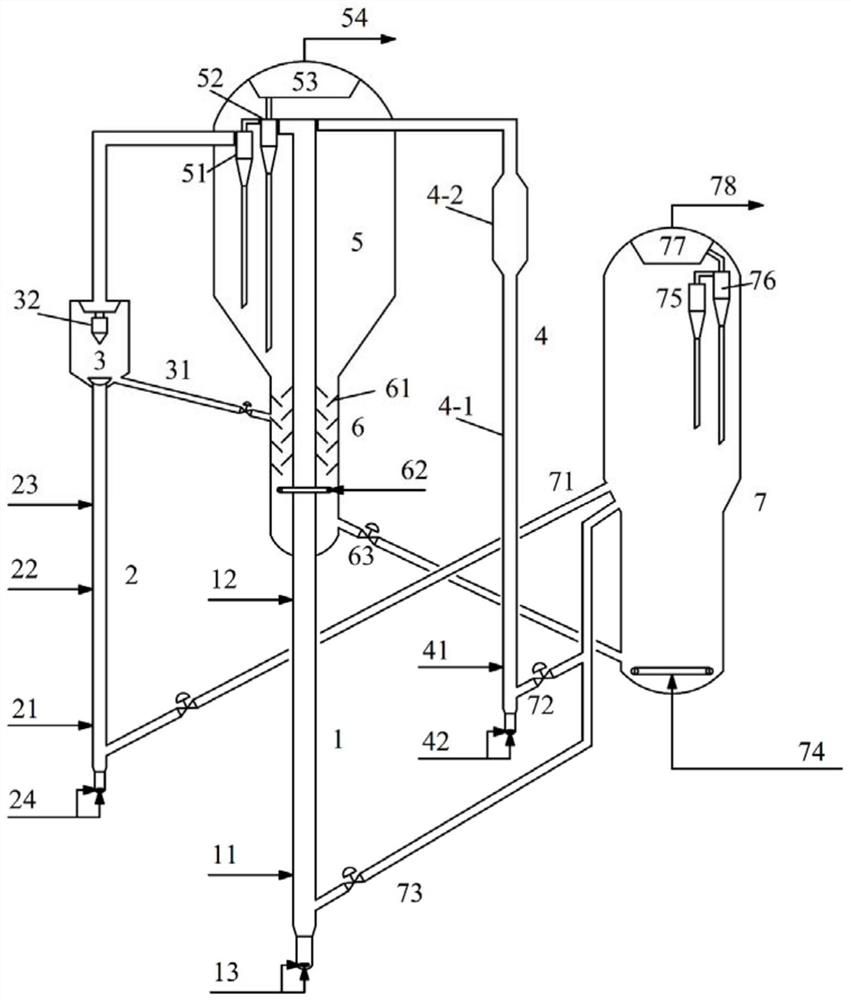Catalytic conversion method and catalytic conversion device for productive low-carbon olefin
A low-carbon olefin and catalyst technology, which is applied in the field of catalytic conversion and devices of high-yield low-carbon olefins, can solve the problems that the yield needs to be further improved, there is no coupling optimization, etc., so as to reduce the hydrogen transfer reaction, reduce the thermal cracking reaction, reduce the Effect of dry gas yield
- Summary
- Abstract
- Description
- Claims
- Application Information
AI Technical Summary
Problems solved by technology
Method used
Image
Examples
Embodiment 1
[0062] The tests were carried out on a medium-scale test rig. The plant consists of three riser reactors and one fluidized bed reactor. The inner diameter of the first riser reactor 1 is 16mm, and the length is 3200mm. The inner diameter of the second riser reactor 2 is 16mm, and the height is 3000mm. The inner diameter of the fluidized bed reactor 3 is 64mm, and the height is 500mm. Reactor 4 has an inner diameter of 16 mm and a height of 2800 mm. Fresh raw oil is introduced into the bottom of the first riser reactor 1, contacts and reacts with the regenerated catalyst from the regenerator 7, and the reacted oil mixture is separated by a cyclone separator; cracked heavy oil is introduced into the bottom of the second riser reactor 2 , the regenerated catalyst CAT from the regenerator 7 contacts and reacts, and then contacts and reacts with the C4 hydrocarbon introduced into the middle of the second lifting reactor 2, and the resulting oil mixture is introduced into the fluid...
Embodiment 2
[0064] According to the method of embodiment 1, difference is that the 3rd riser reactor 4 is made up of two reaction zones, wherein the inner diameter of the first reaction zone is 16mm, and the height is 2000mm, and the inner diameter of the second reaction zone is 30mm, and the height is 2000mm. 800mm. The reaction conditions and results are shown in Table 3.
Embodiment 3
[0066] According to the method of embodiment 2, the difference is that in addition to introducing the C4 fraction obtained by fractionation into the second riser reactor 2, the light gasoline fraction obtained by fractionation (distillation range 40 ~ 80 ° C, olefin content is 65% by weight ) is introduced into the second riser reactor 2, and the mass ratio of the cracked heavy oil, C4 hydrocarbons, light gasoline fraction and fresh raw oil is 0.05:0.05:0.05:1. The reaction conditions and results are shown in Table 3.
PUM
| Property | Measurement | Unit |
|---|---|---|
| density | aaaaa | aaaaa |
| pore size | aaaaa | aaaaa |
| length | aaaaa | aaaaa |
Abstract
Description
Claims
Application Information
 Login to View More
Login to View More - R&D
- Intellectual Property
- Life Sciences
- Materials
- Tech Scout
- Unparalleled Data Quality
- Higher Quality Content
- 60% Fewer Hallucinations
Browse by: Latest US Patents, China's latest patents, Technical Efficacy Thesaurus, Application Domain, Technology Topic, Popular Technical Reports.
© 2025 PatSnap. All rights reserved.Legal|Privacy policy|Modern Slavery Act Transparency Statement|Sitemap|About US| Contact US: help@patsnap.com



